

What is a "delusion"? Mental Disorder Symptoms (Psychiatry: General) Christopher Reist (Academic Psychiatrist, Co-Author of “Psychiatry”) gives expert video advice on: Is there anything I can do to avoid developing a mental disorder?

And more... What are the most common symptoms of mental disorders? There are quite a few symptoms of mental disorders, and they can be grouped into broad categories. For example, we have the mood symptoms – and this would be symptoms of depression you see in people that suffer from major depression and have euphoria in the case of manic disorder. Why Atheism Will Replace Religion. By In earlier posts ( here and here ), I documented a clear pattern where atheism blossoms in fast-paced developed countries but is virtually absent in less developed nations (1).
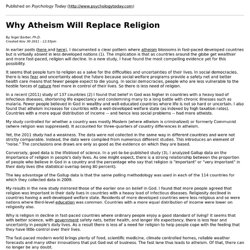
The implication is that as countries around the globe get wealthier and more fast-paced, religion will decline. In a new study, I have found the most compelling evidence yet for this possibility. Is "Freethinker" Synonymous with Nontheist? Jeffery Jay Lowder.
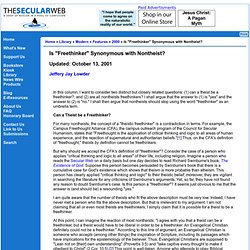
How To Stop Your Child Becoming An Atheist at Kontraband. An Atheist Manifesto. Update: (2/08/2006 1:35 p.m.
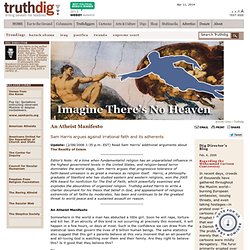
EST) Read Sam Harris’ additional arguments about The Reality of Islam Editor’s Note: At a time when fundamentalist religion has an unparalleled influence in the highest government levels in the United States, and religion-based terror dominates the world stage, Sam Harris argues that progressive tolerance of faith-based unreason is as great a menace as religion itself. Harris, a philosophy graduate of Stanford who has studied eastern and western religions, won the 2005 PEN Award for nonfiction for The End of Faith, which powerfully examines and explodes the absurdities of organized religion.
Still More Things Atheists Didn't Do. This is another installment in our continuing series of Things Atheists Didn’t Do .

A pedophile priest, not an atheist, claimed he was only giving his victim anatomy lessons . Muslims in Pakistan stoned a Christian man to death . His crime? Drinking tea at a roadside stall that was designated for Muslims only. When a Christian church that tortured a gay teen via an exorcism to rid him of his faggy demon was criticized for their stupidity, Dr Gary Cass of the Christian Anti-Defamation Commission slammed the critics , accusing them of intolerance.
An Oregon couple let their 15 month child die of pneumonia , refusing medical treatment and praying for her instead. Why Atheism? Just about everyone is an atheist when it comes to other gods — the gods that other people believe in or that nobody believes in anymore.

I’m an atheist about all gods because there's no reliable evidence for any god, or even for Jesus. There is also extensive evidence that Jesus and all gods are fictional characters — myths created mainly by people who had little understanding of how our universe operates. We all like myths and other stories, but we don't have to believe them. Let’s start with a quick experiment. You can grab three coins and actually do the experiment, or just do a thought experiment. Drop one coin and watch it fall. If you were to the release third coin, what do you think would happen? Our understanding of the world around us, and our abilities to predict what will happen are based on naturalism — the basis of science. To be explicit, modern science relies on methodological naturalism. In “Cosmos” Neil deGrasse Tyson explained the basic rules of science.
Dr. Religion directory, Informations and guides of Religions, Religions resource online. Atheism: Definitions of atheism. Oxford English Dictionary (OED), Second Edition Here is how the OED defines "atheism": atheism Disbelief in, or denial of, the existence of a god. disbelieve 1. trans.
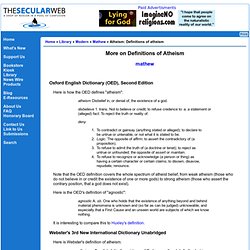
Not to believe or credit; to refuse credence to: a. a statement or (alleged) fact: To reject the truth or reality of. deny To contradict or gainsay (anything stated or alleged); to declare to be untrue or untenable, or not what it is stated to be. Capella's Guide to Atheism - A guide from an ex-Christian to Bible errors, Bible contradictions, Bible atrocities, etc… as well as general problems with Christian beliefs » Were the Egyptian Pyramids Ever Underwater? The Sphinx and the Pyramids of Giza were all built by 2500 BCE, before the Bible says Noah’s flood occurred.
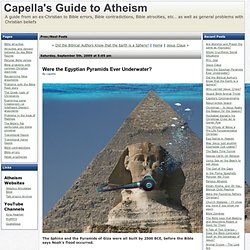
According to the Bible in the year 2348 BCE the earth was plunged into a global flood which killed everyone everywhere because everyone was doing everything naughty (except Noah and his immediate family). How do we know the Bible says 2348 BCE for the flood? Because in the 17th century an Irish fellow named James Ussher figured it out by carefully adding up the ages of the ancestors of Jesus as listed in the Bible all the way back to Adam. He also determined that according to the Bible the universe was created in 4004 BCE. But hold on….among other historical problems with these dates is the fact that Egypt has been continuously occupied from 5400 BCE through today. Atheism: A Rough History of Disbelief. Atheism: A Rough History of Disbelief – known in the United States as A Brief History of Disbelief – is a 2004 television documentary series written and presented by Jonathan Miller for the BBC and tracing the history of atheism.
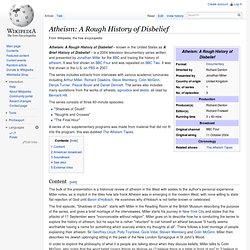
It was first shown on BBC Four and was repeated on BBC Two. It was first shown in the U.S. on PBS in 2007. The series includes extracts from interviews with various academic luminaries including Arthur Miller, Richard Dawkins, Steve Weinberg, Colin McGinn, Denys Turner, Pascal Boyer and Daniel Dennett. The series also includes many quotations from the works of atheists, agnostics and deists, all read by Bernard Hill. Table of Contents.